Singapore election: what’s to blame for the opposition’s failure to make inroads?
As the dust settles after a charged polling season, observers point to changing voter patterns among supporters, signalling the beginning of the end for some parties
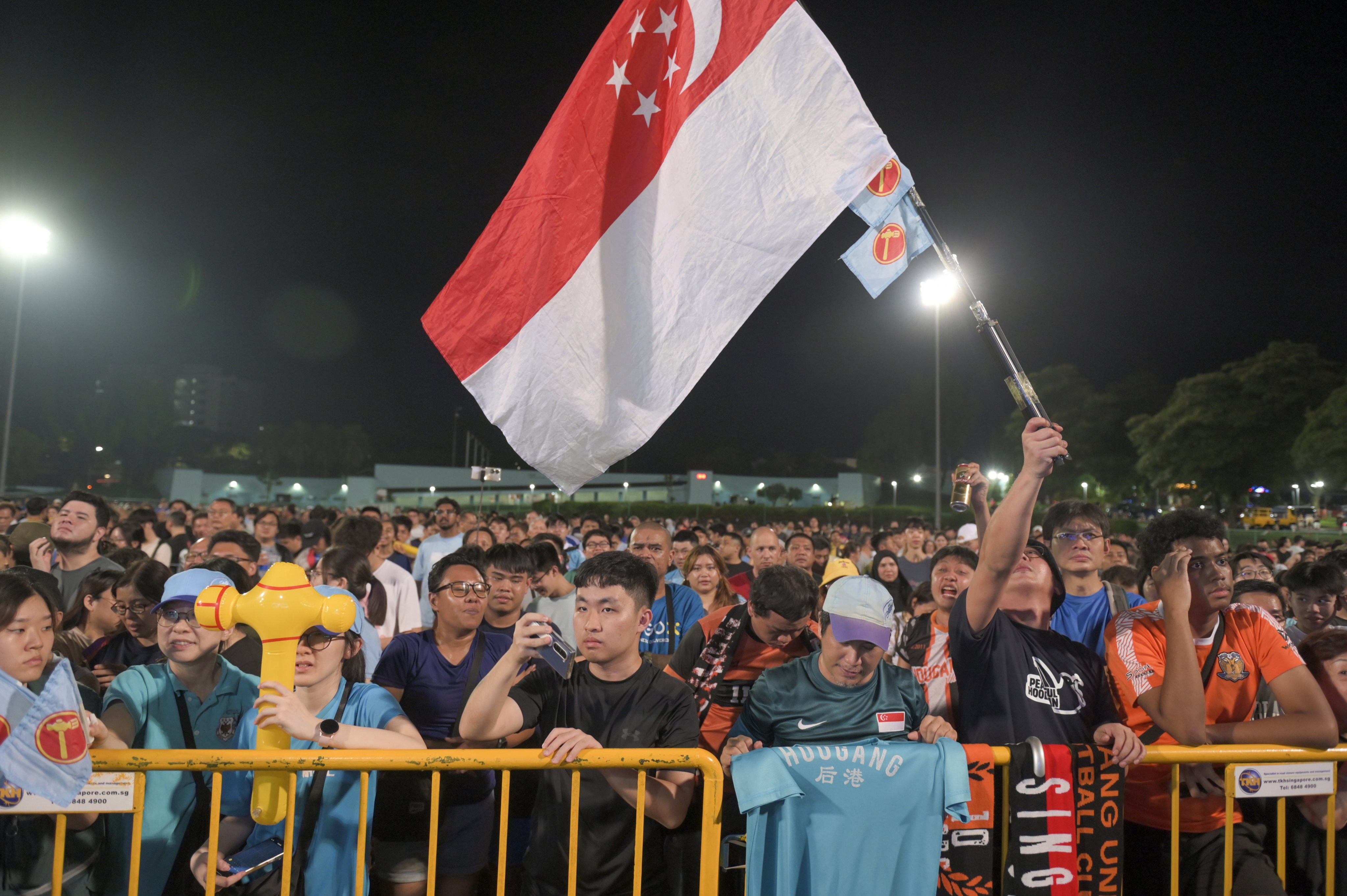
Singapore’s opposition parties entered the 14th general election on Saturday buoyed by loud public discontent over rising cost of living and an electorate widely seen as craving political diversity.
However, in the quiet of the ballot box, Singaporeans opted not to give the opposition further inroads across several hot wards – with the Workers’ Party (WP) retaining its seats and smaller challengers propping up the ruling party’s landslide vote share.
The People’s Action Party (PAP) clinched 87 of the 97 seats and secured a 5 percentage-point jump from the previous 2020 general election, while the opposition maintained the constitutional minimum of 12 seats, including 10 elected seats.
During the nine-day sprint to the ballot box, Prime Minister Lawrence Wong drilled into the electorate the need to give him a strong mandate and a full-strength cabinet to weather the economic headwinds unleashed by the intensifying US-China trade war and American President Donald Trump’s “Liberation Day” tariffs.
“It’s a clear signal of trust, stability and confidence in your government. Singaporeans, too, can draw strength from this and look ahead to our future with confidence,” he told reporters in a post-mortem briefing on Sunday morning.
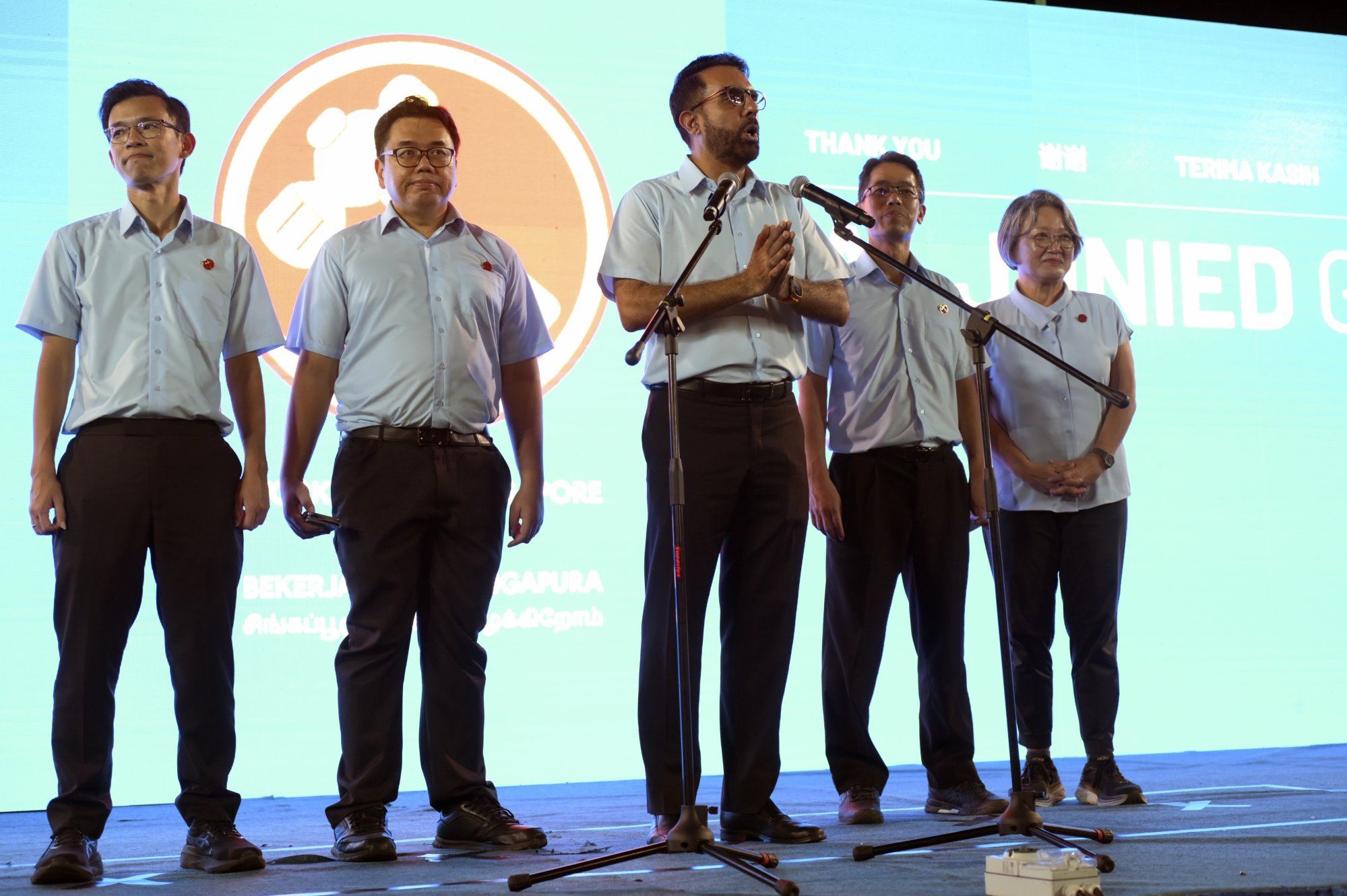
Analysts have been quick to point out that Singapore voters, in line with other democracies who held elections recently, such as Canada and Australia, preferred to stick with the incumbent and the team they knew best amid Trump’s tariff war.
During a webinar organised by scholars at Academia.sg on the election outcome the following morning, Chong Ja Ian, a political scientist from the National University of Singapore, said the same “flight to familiarity” effect was at play with Singaporean voters.
Describing Singaporeans as “notoriously risk-averse and skittish”, Chong said: “At a time of uncertainty, there is a search for something that’s familiar, and so happens that the Workers’ Party has entrenched themselves as a familiar face and I think that’s reflected in the vote share.”
In 2020, the WP won 50.49 per cent of the vote in the six constituencies it contested in, and it largely maintained that mark in this election cycle, at 50.04 per cent in eight constituencies.
“The WP have really entrenched their positions in Aljunied, Hougang and Sengkang and while they may be disappointed that they did not make any further inroads, they gave a good fight in Jalan Kayu and Tampines,” said Nydia Ngiow, managing director at BowerGroupAsia.
But political observers say the PAP’s resounding victory also indicates that its campaign message had struck the right chord with voters and it had little trouble squeezing out other adversaries such as the Progress Singapore Party (PSP), led by defector Tan Cheng Bock, and the Singapore Democratic Party (SDP), led by Chee Soon Juan.
Former PAP MP Inderjit Singh said Wong and the PAP leadership managed to successfully link the wider geopolitical uncertainty to bread-and-butter issues such as the cost of living.
“When it came to the crunch, it was the bread-and-butter issues that mattered, but PAP convinced voters that it would solve those problems if it had a strong government and that it would get worse if anyone else was elected,” Singh added.
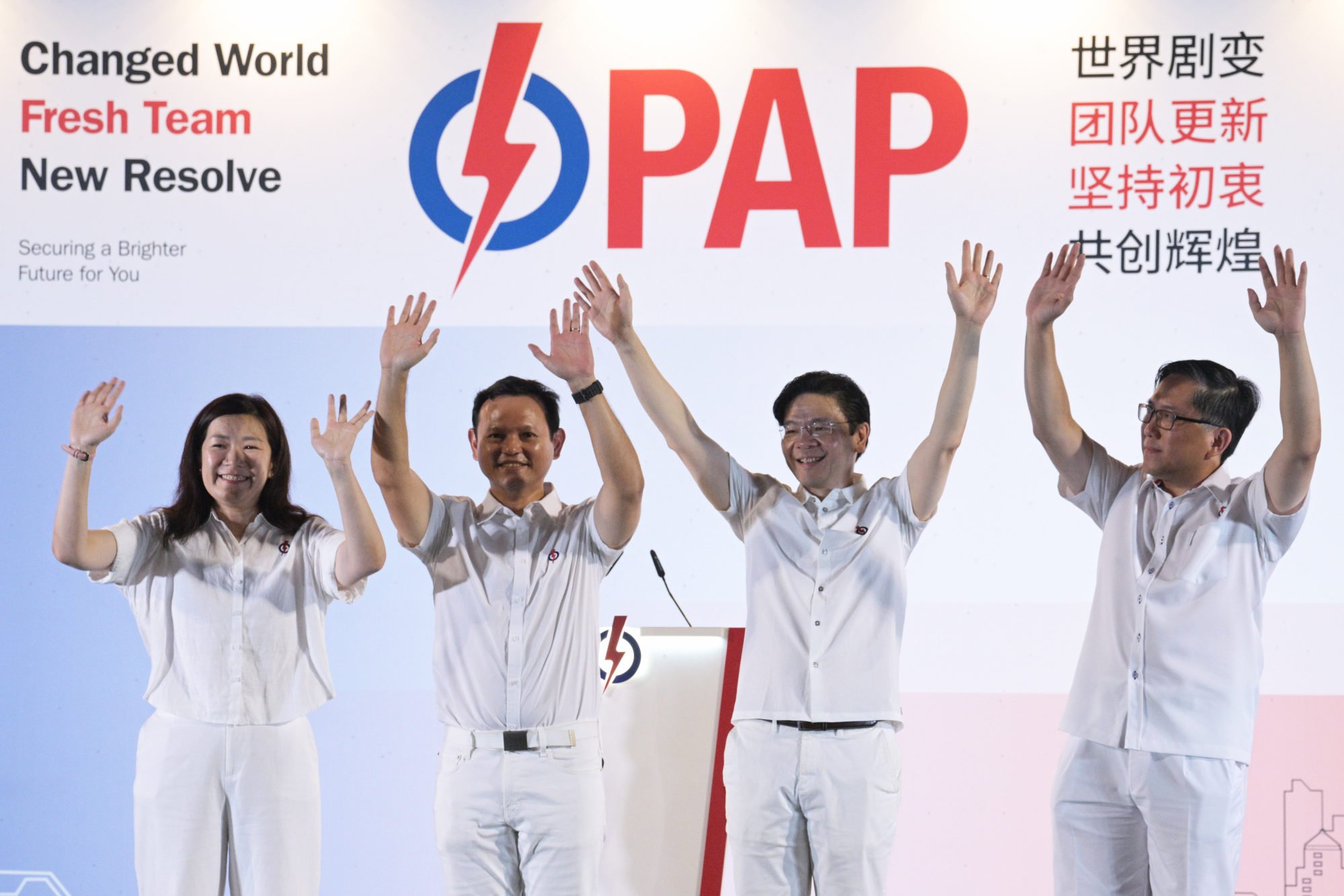
Gone are the protest voters?
Despite the economic anxieties troubling Singaporeans, this year’s results suggest that fewer voters chose the opposition for the sake of sending a message to the PAP, according to analysts.
The PAP improved its vote share to 65.57 per cent compared with 61.24 per cent in 2020, with two single-seats and one multi-seat ward winning at least 80 per cent of the vote, and another two single-seats and five multi-seats scoring at least 75 per cent. These huge margins were thanks to weaker opposition rivals, not the incumbent’s biggest opponent, the WP.
These smaller opposition parties scored much lower than the typical opposition baseline of support, suggesting a savvier electorate that does not just vote opposition as a form of protest. The Red Dot United (RDU) and People’s Alliance for Reform (PAR) barely scratched more than 20 per cent of the vote where they contested, others did even worse.
From the 1984 general election through to 1997, the opposition consistently secured more than 35 per cent of the popular vote. Between 2001 and 2015, its share fluctuated from 24.7 to 39.9 per cent. These figures suggest the opposition’s baseline support has historically ranged between 25 and 35 per cent through political cycles.
Teo Kay Key, a research fellow at the Institute of Policy Studies, said: “I think this indicates that the proportion of voters who vote opposition regardless of party has dropped.
“It also likely indicates that more voters are now discerning about voting for the opposition, meaning that they will look at the party branding, policy position, and candidates before casting a vote for the opposition.”
The baseline was typically derived from the vote share that opposition parties in general obtained in the areas where they performed the worst, she added.
On the other hand, the WP’s ability to maintain its vote share from the 2020 general election reflects brand loyalty over time despite the slew of challenges it faced in the last electoral cycle.
“The close margins in Jalan Kayu, Punggol and Tampines show that voting for WP is no longer just a form of protest against the incumbent but rather a genuine desire to see WP act as the residents’ voice in these constituencies as well,” she said, pointing out that the party’s vote share had stabilised since the last poll.
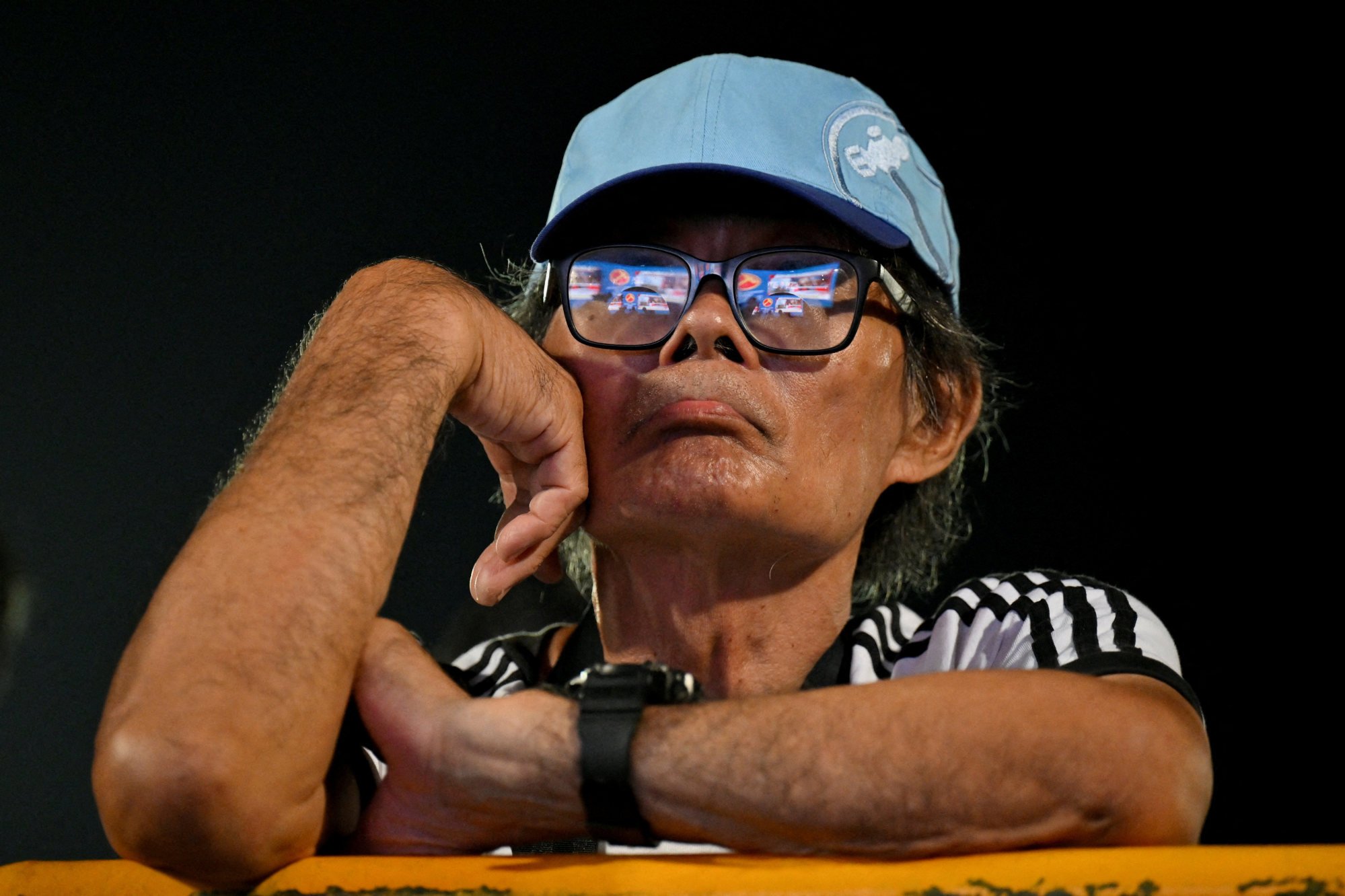
Why it didn’t work for the WP
The party contested 26 seats in this election, up from 21 in 2020 but below its record of 28 in the 2015 election.
Prior to the electoral boundary report changes being published on March 11, WP new recruits Harpreet Singh and Jackson Au were spotted on the ground in Marine Parade. However following the boundary changes, which included redrawing PAP stronghold MacPherson single ward into the constituency, the pair were later fielded in new constituency Punggol.
On whether boundary changes affected his party’s chances of making inroads, WP chief Pritam Singh on Sunday said: “Well, I mean, we saw what happened in Marine Parade, and we decided not to walk into that and decided to pivot somewhere else.
“No matter what the EBRC [Electoral Boundaries Report Committee] does, we must be on our toes. And I think that has to be something that any political party worth its salt must be able to keep in mind,” Singh told reporters on Sunday. He also noted that the EBRC reported to the prime minister.
He called the election difficult and said two factors stood out: Lawrence Wong undergoing his first election as prime minister and the concern about the international environment which “resonated with some voters”.
He said in light of the 5 percentage-point swing to the incumbent, the negligible change in his party’s vote share in wards it contested was “commendable”.
Asked if it would be difficult to keep attracting high-calibre candidates in light of a lack of significant inroads into parliament, Singh said: “This will be the nature of the political system in Singapore. You have very strong government, a government that is dominant in almost all aspects of our lives.
“The challenges are real, but yet, I believe there are enough Singaporeans out there who want to contribute towards public service.”
It would be “very optimistic” to call Singapore a two-party system and an opposition wipeout was still a possibility, he warned.
“Let’s be very clear about it. I think if people think that the opposition is here to stay, I’m not so sure I’m so sanguine, because you can’t read the ground as well as you could before,” he said.
Asked if the failure to make further inroads was a setback for renewal, WP chair Sylvia Lim noted that the party secured three new elected MPs and its two Non-constituency Member of Parliament (NCMP) spots could provide a platform for fresher faces to get parliamentary experience. The leaders did not confirm who would fill the two spots.
“There’s an opportunity here for us, so we should not be so sad, because, I mean, politics is a long road, and every milestone that you reach, there will always be something that you can make use of,” Lim said.
“We saw what happened in Marine Parade, and we decided not to walk into that and decided to pivot somewhere else,” Singh said, praising volunteers for their swiftness in moving to the newly carved out Punggol GRC (Group Representation Constituency) where the team was pitted against Deputy Prime Minister Gan Kim Yong and lost with 44.83 per cent of the vote.
The closest group constituency battle took place in Tampines GRC where race and religious overtones reverberated, with WP vice-chair Faisal Manap moving out of his seat in Aljunied to face the PAP team led by Minister-in-charge of Muslim Affairs Masagos Zulkifli. The eastern district is home to the highest proportion of Malay voters in the country, estimated to be around 25 per cent.
The PAP team won with 52.02 per cent of the vote while Faisal’s team trailed with 47.37 per cent. The remaining votes went to the two smaller opposition parties, which accounted for less than 1 per cent of the vote.
Midway through the campaign Prime Minister Wong called a press conference to stress the importance of leaving religion out of politics, urging parties to make clear their stance that the two should not be mixed. He also drew attention to an activist whom he said was encouraging Muslims to vote for candidates who were willing to “advance his religious agenda”.
Analysts said that since both the PAP and WP handled the situation swiftly it had minimal bearing on voters in Tampines.
“All parties made the disclaimer that they did not accept identity politics so the issue was swiftly cleared up,” independent political observer Felix Tan said.
Inderjit Singh likewise noted that the WP distanced itself from the issue quickly, which allowed parties to move on.
A possible explanation for why the PAP were able to fend off the high-caliber candidates from WP is the groundwork laid by some of its MPs, say analysts.
Walid Jumblatt Abdullah, a political scientist from the Nanyang Technological University, argued on his show Teh Tarik With Wali that the contest was not between Faisal and Masagos, who led their slates, but really between Faisal and PAP’s Baey Yam Keng, known for being very active on the ground.
Groundwork and familiarity with residents were key to winning votes in an election, according to Eugene Tan, law don from the Singapore Management University.
“For the incumbent, in a party line-up of four or five candidates in a GRC, not all will do equally well in their individual wards. A particularly poor performance in one ward could compromise the winning prospects of the entire slate.”
Ngiow argued it might not have been anchor ministers who carried the team over the line but MPs active on the ground. She singled out PAP’s Sun Xueling in Punggol, who was previously in a single ward which was absorbed into the GRC for this election.
“Not being able to previously rely on an anchor minister for support makes for good training since they have to campaign on their own merit and form critical personal connections on the ground with residents. Such connections and stronger visibility and recognition by their residents paid off well in the 2025 general elections.”
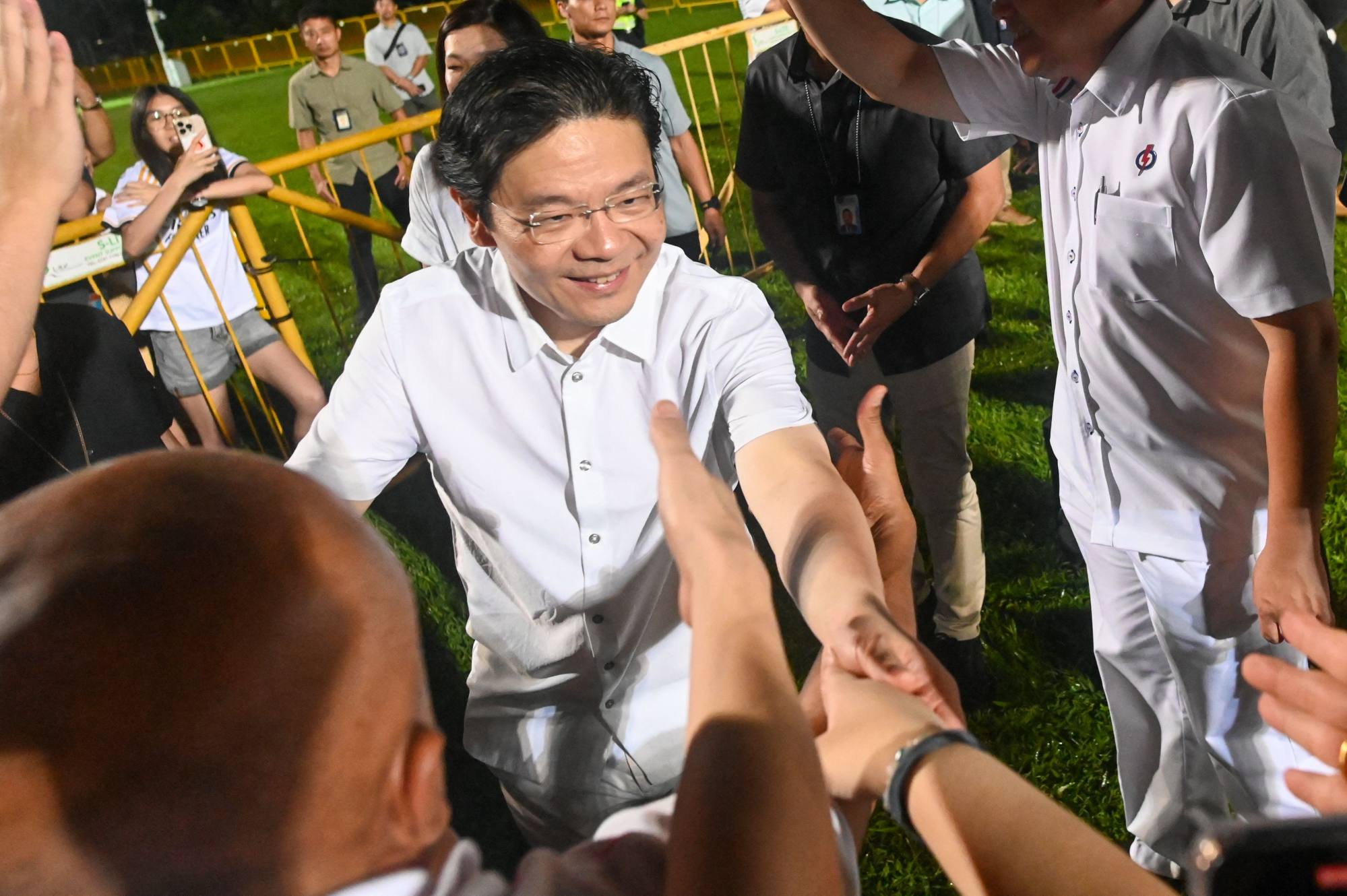
Time to call it quits?
While larger parties such as the PAP, WP and SDP held watch parties for their supporters to tune in to the results on Saturday night, PSP candidates huddled together behind closed doors in their office in Bukit Timah.
They had informed the media they would hold a press conference following the results, but after the sample count provided an early indication that their “A” team in West Coast-Jurong West were down some 39 per cent to the PAP’s 61 per cent, founder Tan Cheng Bock left the headquarters without a word and the media briefing was cancelled.
Secretary-general Leong Mun Wai said in a statement that the party was shocked by the results. “We will study seriously and humbly into our failure, and reconsider how we can gain further trust from Singaporeans. We may need to review our strategy and regroup ourselves to fight another day.”
The night signified what analysts described as the beginning of the end of the party, which stomped onto the scene just one election earlier in 2020 and earned two coveted NCMP seats for being the best-performing losers in West Coast GRC.
“This will be the start of the end of PSP because Cheng Bock was the glue holding everything together. Without him, they may not last long,” said Inderjit Singh, noting that Tan, 85, had said 2025 would be his last election.
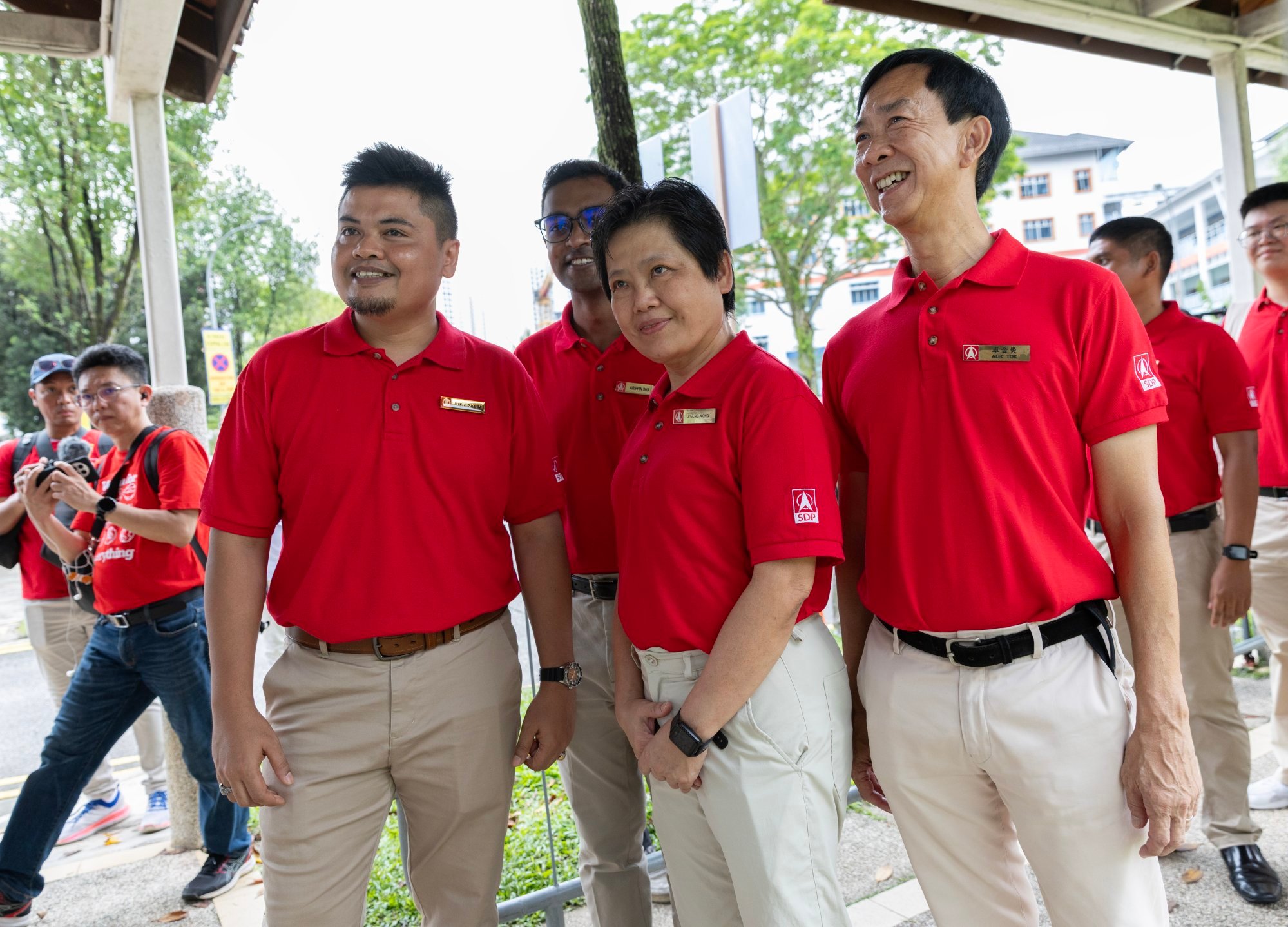
Another constituency that was closely watched but ended up returning comfortably to the PAP was Bukit Panjang where SDP’s Paul Tambyah, an infectious diseases expert, faced Liang Eng Hwa in a rematch of a close fight from the 2020 poll where Tambyah secured 46.26 per cent of the vote.
However Tambyah’s vote share dropped to 38.59 per cent even though the boundaries were unchanged.
Looking ahead, the polls show a bleak future for fringe opposition parties with Singapore voters now expecting more from them.
Meanwhile smaller opposition parties such as the PPP and NSP garnered scant support at the ballot box, propping up the PAP’s high vote share.
Most of these candidates forfeited their election deposits, a requirement if they do not secure more than 12.5 per cent of the votes polled. The People’s Power Party (PPP) and National Solidarity Party (NSP) had each lost S$135,000 (US$103,800) in deposits, a sum that observers say underscores the fading relevance of these groups in the current political landscape.
“Outside of the WP and arguably SDP, the results have sent a clear signal to the opposition parties that their values, positions and messages are not resonating with the general populace, even for parties that have stayed in familiar grounds,” Ngiow said.
Tan from SMU said that while there might be an appetite for greater plurality in parliament, it did not necessarily mean any opposition party would meet the mark.
“Singaporeans again demonstrate their savvy, discernment, and objectivity in this election: no votes for the opposition for opposition’s sake. But more than that: they are holding the opposition to a higher standard,” he said.
The result reflects more “room for the opposition to grow” before they win over voters, he added.